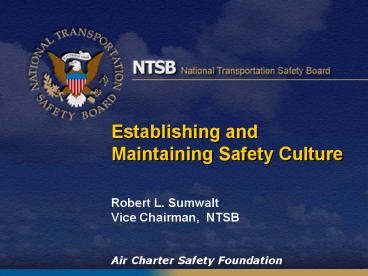Establishing and Maintaining Safety Culture PowerPoint PPT Presentation
1 / 40
Title: Establishing and Maintaining Safety Culture
1
Establishing and Maintaining Safety Culture
- Robert L. Sumwalt
- Vice Chairman, NTSB
- Air Charter Safety Foundation
2
Do you have a safety culture?
3
Do you have a Safety Culture?
- it is worth pointing out that if you are
convinced that your organization has a good
safety culture, you are almost certainly
mistaken. - a safety culture is something that is striven
for but rarely attained - the process is more important than the
product.- James Reason, Managing the Risks of
Organizational Accidents.
4
NTSB Perspective on Corporate Culture
- Weve found through 30 years of accident
investigation that sometimes the most common link
is the attitude of corporate leadership toward
safety. - - Honorable Jim Hall
- Symposium on
- Corporate Culture
- and Transportation
- Safety
- April 1997
5
NTSB Perspective on Corporate Culture
- The safest carriers have more effectively
committed themselves to controlling the risks
that may arise from mechanical or organizational
failures, environmental conditions and human
error.
- Symposium on
- Corporate Culture
- and Transportation
- Safety
- April 1997
6
Corporate Culture is
Triggered at the top
Measured at the bottom
Corporate culture starts at the top of the
organization and permeates the entire
organization.
7
Culture Defined
- Culture is a set of established beliefs, values,
norms, attitudes and practices of an
organization.
8
Culture Simplified
- The way we do things here!
9
Safety Culture
- Employees do the right things, even when no one
is watching. - Integrity
- Core values
10
Core Values of SCANA Aviation Dept.
- Safety and Security - Compliance -
Acknowledging our strengths addressing our
shortcomings - Nice to work with - Achieve the
vision
- S
- C
- A
- N
- A
11
Roadmap to Safety Culture
- Lautman-Gallimore Study
- James Reason
12
Lautman-Gallimore Study
13
Lautman-Gallimore Study
- Looked at the worldwide Boeing fleet for a 10
year period (1975-1984) - 16 percent of the operators account for over 80
percent of the accidents.
14
Lautman-Gallimore Findings Best Practices
- Management emphasis on safety
- Safety begins at top of organization
- Safety permeates the entire operation
15
Lautman-Gallimore Findings Best Practices
- Standardization and discipline
- Management stresses need for these items
- Cockpit procedural compliance, callouts, and
checklist usage are tightly controlled.
16
(No Transcript)
17
(No Transcript)
18
Standardization
- Maneuvers Guide contained key procedures for
briefing and conducting instrument approaches - Pilots were expected to adhere to procedures in
Maneuvers Guide - Maneuvers Guide was only issued to the chief
pilot and instructors
19
Standardization
- Company check airman rated companys
standardization as 6 - Company pilot Fair to good
- Lead ground instructor Fair
- Suspected that some pilots were following SOPs
while others were not - Aware that some pilots used their own checklists,
instead of company checklists - Another pilot never seen any standardized
callouts documented in any company manual - To compensate, she used callouts she used at
another company
20
Lautman-Gallimore Findings Best Practices
- Flight Operations quality control programs
- conducted safety audits
- confidential incident reporting systems
21
Lautman-Gallimore Findings Best Practices
- Training
- Strong quality control program of training
- Accomplished their own training so that positive
control of standardization and discipline are
maintained
22
Lautman-Gallimore Findings Best Practices
- Management emphasis
- Standardization and discipline
- Flight Ops quality control
- Training
23
(No Transcript)
24
Professor James Reason
25
The Organizational Aim
- To establish a safety culture where constructive
criticism and safety observations are encouraged
and acted upon in a positive way.
26
Excellence
- Without exception, the dominance and coherence
of culture proved to be an essential quality of
the excellent companies. - In these strong culture companies, people way
down the line know what they are supposed to do
in most situations because the handful of guiding
values is crystal clear. - T.J. Peters and R.H. Waterman, In Search of
Excellence Lessons from Americas Best-Run
Companies.
27
Components of Safety Culture
- Informed Culture
- Reporting Culture
- Learning Culture
- Just Culture
Source James Reason, Ph.D.
28
Informed Culture
- Informed culture the organization collects and
analyses the right kind of data to keep it
informed of the safety health of the
organization - Creates a safety information system that
collects, analyzes and disseminates information
on incidents and near-misses, as well as
proactive safety checks.
29
Pinnacle Airlines Flight 3701 Jefferson City,
Missouri
- October 14, 2004
30
Reporting Culture
- Employees are open to report safety problems
- They know they will not be punished or ridiculed
for reporting - Non-reprisal policy signed by CEO
- Confidentiality will be maintained or the data
are de-identified - They know the information will be acted upon
31
(No Transcript)
32
(No Transcript)
33
Learning Culture
- In short, the organization is able to learn and
change from its prior mistakes
34
Learning Culture
- Learning disabilities are tragic in children,
- but they are fatal in organizations.
- Peter Senge, The Fifth Discipline The Art and
Practicing of the Learning Organization
35
Just Culture
- Basically, this means that employees realize they
will be treated fairly - Not all errors and unsafe acts will be punished
(if the error was unintentional) - Those who act recklessly or take deliberate and
unjustifiable risks will be punished - Substitution test
36
www.flightsafety.org
37
Just Culture
- An atmosphere of trust in which people are
encouraged (even rewarded) for providing
safety-related information, but in which they are
also clear about where the line must be drawn
between acceptable and unacceptable behavior.
38
(No Transcript)
39
Do you have a safety culture?
40
- Safety culture is about having the will to do
something not the money. - The Honorable Debbie Hersman
41
(No Transcript)

